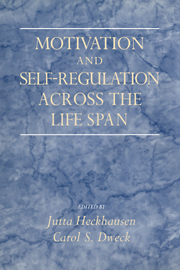Book contents
- Frontmatter
- Contents
- Preface and Acknowledgments
- List of Contributors
- Introduction
- I Regulation of Self, Action, and Development
- II Social Determinants of Motivation
- III Functional and Dysfunctional Control-Related Behavior in Childhood
- 9 Ruminative Coping with Depression
- 10 The Development of Early Self-Conceptions: Their Relevance for Motivational Processes
- 11 Sociocultural Influences on the Development of Children's Action-Control Beliefs
- 12 Commentary: Self-Regulation, Motivation, and Developmental Psychopathology
- IV Developmental Goals in Adulthood
- Name Index
- Subject Index
9 - Ruminative Coping with Depression
Published online by Cambridge University Press: 24 September 2009
- Frontmatter
- Contents
- Preface and Acknowledgments
- List of Contributors
- Introduction
- I Regulation of Self, Action, and Development
- II Social Determinants of Motivation
- III Functional and Dysfunctional Control-Related Behavior in Childhood
- 9 Ruminative Coping with Depression
- 10 The Development of Early Self-Conceptions: Their Relevance for Motivational Processes
- 11 Sociocultural Influences on the Development of Children's Action-Control Beliefs
- 12 Commentary: Self-Regulation, Motivation, and Developmental Psychopathology
- IV Developmental Goals in Adulthood
- Name Index
- Subject Index
Summary
Abstract
Most people have periods in which they become at least moderately depressed: they feel sad, they lose their motivation and interest in their usual activities, they slow down and are chronically fatigued, and so on. For most people, these periods last only a few days and their symptoms never become debilitating. For others, these periods last weeks or months, and their symptoms become worse with time. I suggest that the ways people initially try to regulate or cope with their symptoms of depression can affect the severity and duration of these symptoms. Specifically, people who have a ruminative style of responding to their initial symptoms of depression will have longer and more severe episodes of depressed mood than people who have more active, less ruminative response styles. A ruminative response style for depression is defined as the tendency to focus passively and repetitively on one's symptoms of depression and on the possible causes and consequences of those symptoms without taking action to relieve them. Ruminative responses to depression exacerbate and prolong periods of depression through at least three mechanisms. First, rumination enhances the negative effects of depressed mood on thinking, making depressive interpretations of events and negative memories more accessible and more likely to be used in ongoing deliberations about one's life. Second, rumination interferes with complex interpersonal problem-solving, in part because it enhances pessimistic, distorted thinking. Third, rumination inhibits people from engaging in everyday instrumental behaviors that could enhance their sense of control and lift their moods.
- Type
- Chapter
- Information
- Motivation and Self-Regulation across the Life Span , pp. 237 - 256Publisher: Cambridge University PressPrint publication year: 1998
- 66
- Cited by

